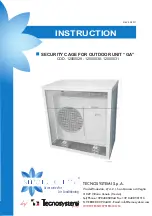
Air and moisture in the refrigerant system have undesirable effects as indicated below:
Pressure in the system rises.
Operating current rises.
Cooling or heating efficiency drops.
Moisture in the refrigerant circuit may freeze and block capillary tubing.
Water may lead to corrosion of parts in the refrigeration system.
Therefore, the indoor unit and tubing between the indoor and outdoor unit must be leak tested
and evacuated to remove any noncondensables and moisture from the system.
Air purging with vacuum pump
Preparation
Check that each tube (both liquid and gas side tubes) between the indoor and outdoor units
have been properly connected and all wiring for the test run has been completed. Remove
the service valve caps from both the gas and the liquid side on the outdoor unit. Note that
both the liquid and the gas side service valves on the outdoor unit are kept closed at this
stage.
Pipe length and refrigerant amount:
Connective
pipe length
Less than
16.41 feet (5m)
More than
16.41 feet (5m)
Air purging
method
Use vacuum
pump.
Use vacuum
pump.
Additional amount of refrigerant to be charged
AIR PURGING
Air purging
21
When relocating the unit to another place,
perform evacuation using vacuum pump.
Make sure the refrigerant added into the air
conditioner is liquid form in any case.
Open the valve stem until it hits against the
stopper. Do not try to open it further.
Securely tighten the valve stem cap with a
Crescent Wrench and Service Valve Wrench.
Valve stem cap tightening torque (See
Tightening Torque Table in previous page ).
Outdoor
unit
Indoor
unit
Refrigerant
Flare nut
Stopper
Cap
Valve body
Packed valve
Half union
Gas side
Liquid side
A
C
D
B
Valve stem
Fig.65
Fig.66
Caution in handling the packed valve
0.212 oz/ft



































